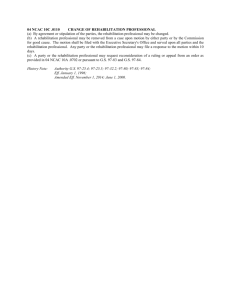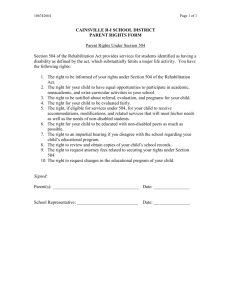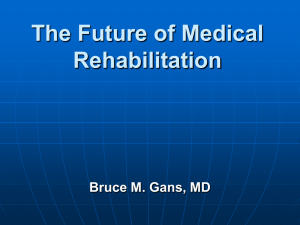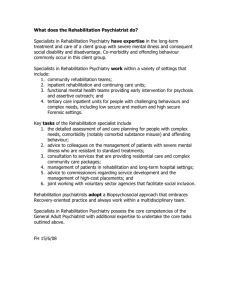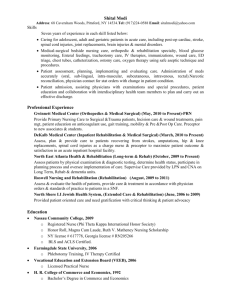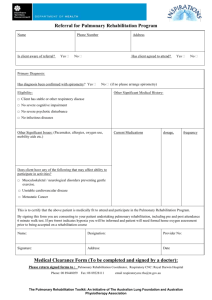Code of Ethics - Association for Education and Rehabilitation of the
advertisement
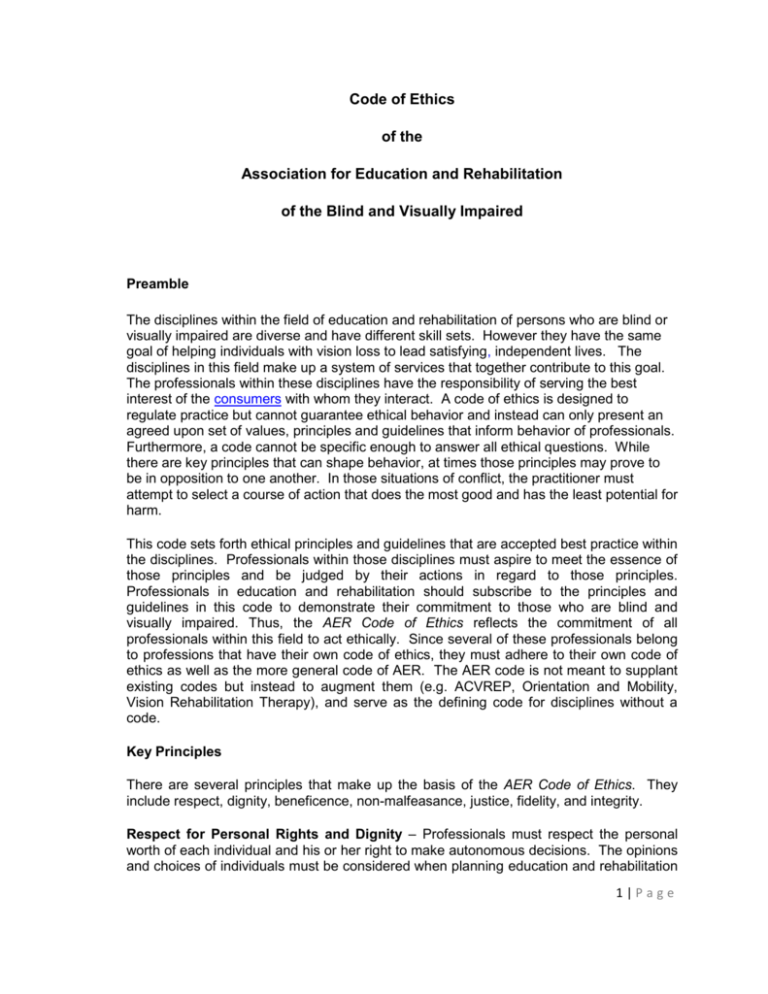
Code of Ethics of the Association for Education and Rehabilitation of the Blind and Visually Impaired Preamble The disciplines within the field of education and rehabilitation of persons who are blind or visually impaired are diverse and have different skill sets. However they have the same goal of helping individuals with vision loss to lead satisfying, independent lives. The disciplines in this field make up a system of services that together contribute to this goal. The professionals within these disciplines have the responsibility of serving the best interest of the consumers with whom they interact. A code of ethics is designed to regulate practice but cannot guarantee ethical behavior and instead can only present an agreed upon set of values, principles and guidelines that inform behavior of professionals. Furthermore, a code cannot be specific enough to answer all ethical questions. While there are key principles that can shape behavior, at times those principles may prove to be in opposition to one another. In those situations of conflict, the practitioner must attempt to select a course of action that does the most good and has the least potential for harm. This code sets forth ethical principles and guidelines that are accepted best practice within the disciplines. Professionals within those disciplines must aspire to meet the essence of those principles and be judged by their actions in regard to those principles. Professionals in education and rehabilitation should subscribe to the principles and guidelines in this code to demonstrate their commitment to those who are blind and visually impaired. Thus, the AER Code of Ethics reflects the commitment of all professionals within this field to act ethically. Since several of these professionals belong to professions that have their own code of ethics, they must adhere to their own code of ethics as well as the more general code of AER. The AER code is not meant to supplant existing codes but instead to augment them (e.g. ACVREP, Orientation and Mobility, Vision Rehabilitation Therapy), and serve as the defining code for disciplines without a code. Key Principles There are several principles that make up the basis of the AER Code of Ethics. They include respect, dignity, beneficence, non-malfeasance, justice, fidelity, and integrity. Respect for Personal Rights and Dignity – Professionals must respect the personal worth of each individual and his or her right to make autonomous decisions. The opinions and choices of individuals must be considered when planning education and rehabilitation 1|Page programs. Only when choices may be harmful should alternative interventions be considered. When working with persons who have reduced autonomy or diminished capacity there is an obligation to be sure that they have adequate protection. Beneficence and Non-malfeasance - Professionals must ensure a consumer’s safety and avoid imposing or inflicting harm upon that person. Beneficence is often defined as providing acts of kindness or charity but for the purposes of this code it is an obligation to do good to the consumer, and to maximize possible benefits as a result of services provided. Professionals must strive to facilitate experiences that will be positive for consumers and insure their rights. It is the duty of the practitioner to avoid personal, financial, social, or organizational conflicts that might be detrimental to the consumer. Justice – Professionals are obligated to provide consumers with all the services and benefits to which they are entitled. It is an injustice when entitled benefits are withheld without good cause. People should be treated equally and favoritism should not be tolerated. Unequal treatment should be considered only when eligibility criteria exclude persons from services or when such exclusion is dictated by individual need. Fidelity and Integrity - Professionals should be loyal, honest, truthful, and keep their promises to consumers. They must establish and maintain trusting relationships with their consumers. They must maintain ethical standards of behavior and manage conflicts of interest. They must also engage in ethical behavior with colleagues, and employers. Honesty and truthfulness must extend into their teaching and research. They must accurately represent themselves and their abilities to the consumers who they serve. ETHICAL GUIDELINES COMPETENCE AND ACCOUNTABILITY 1.01 Education and rehabilitation professionals provide services, teach, and conduct research with populations in areas only within the boundaries of their competence, based on their education, training, supervised experience, consultation, study, or professional experience. 1.02 Education and rehabilitation professionals undertake ongoing efforts to develop and maintain their competence. 1.03 Education and rehabilitation professionals who delegate work to employees, supervisees, assistants or who use the services of others, such as interpreters, take reasonable steps to authorize only those responsibilities that such persons can be expected to perform competently on the basis of their education, training, or experience, either independently or with the level of supervision being provided. 2|Page 1.04 Education and rehabilitation professionals should seek the advice and counsel of colleagues whenever such consultation is in the best interests of consumers. 1.05 Education and rehabilitation professionals will claim or will imply only professional credentials possessed and are responsible for correcting any known misrepresentations of their credentials by others. Professional credentials include baccalaureate degrees, graduate degrees, accreditation of graduate programs, national voluntary certifications, government-issued certifications or licenses, or any other credential that might indicate to the public specialized knowledge or expertise in their field of study. 1.06 Education and rehabilitation professionals will follow the guidelines for use of credentials that have been established by the entities that issue the credentials. 1.07 Education and rehabilitation professionals will not attribute more to their credentials than the credentials represent. 1.08 Education and rehabilitation professionals will refer consumers to other specialists as the needs of the consumer dictate. 1.09 Education and rehabilitation professionals will take reasonable steps to consult with other professionals when they have questions concerning ethical obligations or practice issues. ADVOCACY 2.01 Education and rehabilitation professionals will strive to eliminate attitudinal barriers, including stereotyping and discrimination, toward individuals with disabilities and to increase their own awareness and sensitivity to such individuals. 2.02 Education and rehabilitation professionals will remain aware of actions taken by cooperating agencies on behalf of their consumers and will act as advocates of such consumers to ensure effective service delivery. 2.03 Education and rehabilitation professionals will provide the consumer with appropriate information and will support their efforts at self-advocacy both on an individual and an organizational level. ACCESSIBILITY 3.01 Education and rehabilitation professionals will demonstrate, in their practice, an appreciation of the need to provide necessary accommodations, including full participation in program access, accessible facilities and services, to individuals with disabilities. 3|Page 3.02 Education and rehabilitation professionals will identify physical, communication, and transportation barriers to consumers and will communicate information on barriers to public and private authorities to facilitate removal of barriers to access. 3.03 Education and rehabilitation professionals, as advocates for individuals with disabilities, will ensure, prior to referring consumers to programs, facilities, or employment settings, that they are appropriately accessible. RELATIONSHIPS WITH CONSUMERS 4.01 Education and rehabilitation professionals’ primary responsibility is to promote the well-being of consumers. In general, consumers’ interests are primary. However, professionals also have a responsibility to the larger society and must act accordingly. 4.02 In their rehabilitation or education related activities, education and rehabilitation professionals do not engage in unfair discrimination or knowingly engage in behavior that is harassing or demeaning based on age, gender, gender identity, race, ethnicity, culture, national origin, religion, sexual orientation, disability, socioeconomic status, or any basis prohibited by law. 4.03 Education and rehabilitation professionals do not engage in sexual harassment. 4.04 Education and rehabilitation professionals take reasonable steps to avoid harming their, consumers, supervisees, research participants, organizational consumers, and others with whom they work, and to minimize harm where it is foreseeable and unavoidable. 4.05 Education and rehabilitation professionals do not engage in avoidable multiple relationships. 4.06 Education and rehabilitation professionals refrain whenever possible from taking on a professional role when personal, scientific, professional, legal, financial, or other interests or relationships could reasonably be expected to (1) impair their objectivity, competence, or effectiveness in performing their functions or (2) expose the person or organization with whom the professional relationship exists to harm or exploitation. 4.07 Education and rehabilitation professionals will avoid accepting as consumers any person with whom they have had prior intimate relationships. If, because of the unavailability of other competent professionals this is not possible, the nature of any prior relationship should be made known to supervisor(s) for consumer protection and to avoid even the appearance of impropriety. 4|Page RELATIONSHIPS WITH OTHER PROFESSIONALS 5.01 Education and rehabilitation professionals should treat colleagues with respect and should represent accurately and fairly the qualifications, views, and obligations of colleagues. 5.02 Education and rehabilitation professionals should avoid unwarranted negative or demeaning criticism of colleagues in communications with consumers or with other professionals. 5.03 When indicated and professionally appropriate, education and rehabilitation professionals cooperate with other professionals in order to serve their consumers effectively and appropriately. 5.04 Education and rehabilitation professionals delivering services to or through organizations provide information beforehand to consumers and when appropriate those directly affected by the services about (1) the nature and objectives of the services, (2) the intended recipients, (3) which of the individuals are consumers, (4) the relationship the practitioner will have with each person and the organization, (5) who will have access to the information, and (6) limits of confidentiality. 5.05 Unless otherwise covered by contract, education and rehabilitation professionals make reasonable efforts to plan for facilitating services in the event that services are interrupted by factors such as the practitioner’s illness, death, unavailability, relocation, or retirement or by the consumer’s relocation or financial limitations. 5.06 Sexual harassment in the workplace must be avoided. 5.07 Education and rehabilitation professionals who are members of an interdisciplinary team should participate in and contribute to decisions that affect the well-being of consumers by drawing on the perspectives, values, and experiences of their profession. Professional and ethical obligations of the interdisciplinary team as a whole and of its individual members should be clearly established. PRIVACY AND CONFIDENTIALITY 6.01 Education and rehabilitation professionals have a primary obligation and take reasonable precautions to protect confidential information obtained through or stored in any medium, recognizing that the extent and limits of confidentiality may be regulated by law or established by institutional rules or professional or scientific relationship. 5|Page 6.02 Education and rehabilitation professionals discuss with persons (including, to the extent feasible, persons who are legally incapable of giving informed consent or assent and their legal representatives) and organizations with whom they establish a scientific or professional relationship (1) the relevant limits of confidentiality and (2) the foreseeable uses of the information generated through their services. 6.03 Before recording the voices or images of individuals to whom they provide services, education and rehabilitation professionals obtain permission from all such persons or their legal representatives. 6.04 Education and rehabilitation professionals may disclose confidential information with the appropriate consent of the organization, the individual consumer, or another legally authorized person on behalf of the consumer unless prohibited by law. 6.05 Education and rehabilitation professionals disclose confidential information without the consent of the individual only as mandated by law, or where permitted by law for a valid purpose such as to (1) provide needed professional services; (2) obtain appropriate professional consultations; (3) protect the consumer, the professionals themselves or others from harm; or (4) obtain payment for services from a consumer in which instance disclosure is limited to the minimum that is necessary to achieve the purpose. 6.06 Education and rehabilitation professions will maintain up-to-date knowledge of individual laws relative to privacy, confidentiality and privileged communication and strive to protect the anonymity of the consumer as much as possible. 6.07 When releasing information on a consumer to a requesting agency or individual, the education and rehabilitation profession will obtain fully informed, written permission from the consumer to release the information. COMMUNICATION 7.01 Education and rehabilitation professionals will be held to the same level of expected behavior and confidentiality as defined by the AER Code of Ethics regardless of the form of communication they choose to use (i.e., cellular phones, electronic mail, facsimile, video, audio-visual). 7.02 Education and rehabilitation professionals will request professional interpreters when communicating with persons who are Deaf, or those for whom English may not be an appropriate or effective means of communication, including when necessary those for whom English is a second language. 7.03 Education and rehabilitation professionals will request use when appropriate of augmentative communication technology when working with persons with 6|Page speech difficulties and will make every effort to understand consumers’ attempts to communicate even when through behavioral means rather than language. ADVERTISING AND OTHER PUBLIC STATEMENTS 8.01 Education and rehabilitation professionals do not knowingly make public statements that are false, deceptive, or fraudulent concerning their research, practice, or other work activities or those of persons or organizations with which they are affiliated. 8.02 Education and rehabilitation professionals do not solicit testimonials from current consumers or other persons who because of their particular circumstances are vulnerable to undue influence. 8.03 Education and rehabilitation professionals do not exploit the presence of a disability or in any way diminish the respect and dignity due consumers for the purposes of agency fundraising or personal gain. ASSESSMENT 9.01 Whenever possible Education and rehabilitation professionals use assessment instruments whose validity and reliability have been established for use with members of the population tested. When such validity or reliability has not been established, professionals describe the strengths and limitations of test results and interpretation. 9.02 When Education and rehabilitation professionals conduct a record review or provide consultation or supervision and an individual examination is not warranted or necessary for the opinion, professionals explain this and the sources of information on which they based their conclusions and recommendations. 9.03 Education and rehabilitation professionals base the opinions contained in their recommendations, reports, and diagnostic or evaluative statements on information and techniques sufficient to substantiate their findings. 9.04 Education and rehabilitation professionals provide opinions of the functioning of individuals only after they have conducted an examination of the individual adequate to support their statements or conclusions. When, despite reasonable efforts, such an examination is not practical, professionals document the efforts they made and the result of those efforts, clarify the probable impact of their limited information on the reliability and validity of their opinions, and appropriately limit the nature and extent of their conclusions or recommendations. 7|Page PROFESSIONAL AND BUSINESS PRACTICES 10.01 When setting fees, education and rehabilitation professionals should ensure that the fees are fair, reasonable, and commensurate with the services performed. 10.02 Education and rehabilitation professionals should avoid accepting goods or services from consumers as payment for professional services. Bartering arrangements, particularly involving services, create the potential for conflicts of interest, exploitation, and inappropriate boundaries. 10.03 As early as is feasible in a professional or scientific relationship, Education and rehabilitation professionals and recipients of services reach an agreement specifying compensation and billing arrangements. 10.04 When education and rehabilitation professionals agree to provide services to a person or entity at the request of a third party, they attempt to clarify at the outset of the service the nature of the relationship with all individuals or organizations involved. This clarification includes the role of the practitioner, identification of who is the consumer, the probable uses of the services provided or the information obtained, and the fact that there may be limits to confidentiality. 10.05 Education and rehabilitation professionals create, and to the extent the records are under their control, maintain, disseminate, store, retain, and dispose of records and data relating to their professional and scientific work in order to (1) facilitate provision of services later by them or by other professionals, (2) allow for replication of research design and analyses, (3) meet institutional requirements, (4) ensure accuracy of billing and payments, and (5) ensure compliance with law. 10.06 Education and rehabilitation professionals in private practice maintain confidentiality in creating, storing, accessing, transferring, and disposing of records under their control, whether these are written, automated, or in any other medium. 10.07 In their reports to payers for services or sources of research funding, Education and rehabilitation professionals take reasonable steps to ensure the honest and accurate reporting of the nature of the service provided, the fees, charges, or payments, and where applicable, the identity of the provider, and the findings. 10.08 Education and rehabilitation professionals terminate services when it becomes reasonably clear that the consumer no longer needs the service, is not likely to benefit, or is being harmed by continued service. Except where precluded by the actions of consumers or third-party payers, prior to termination, Education and rehabilitation professionals provide pretermination advising and suggest alternative service providers as appropriate. 8|Page UNIVERSITY BASED EDUCATION AND TRAINING 11.01 Education and rehabilitation professionals responsible for education and professional training programs take reasonable steps to ensure that the programs are designed to provide the appropriate knowledge and proper experiences for students, and to meet the requirements for licensure, certification, or other goals for which claims are made by the program. 11.02 Education and rehabilitation professionals take reasonable steps to ensure that course syllabi are accurate regarding the subject matter to be covered, bases for evaluating progress, and the nature of course experiences. This standard does not preclude an instructor from modifying course content or requirements when the instructor considers it pedagogically necessary or desirable, so long as students are made aware of these modifications in a manner that enables them to fulfill course requirements. 11.03 Education and rehabilitation professionals do not require students to disclose personal information in course or program-related activities, either orally or in writing, regarding sexual history, history of abuse and other non-relevant information. 11.04 Education and rehabilitation professionals will consider all communication with students confidential, except in the event that the student suggests a harmful act has been committed or when a student suggests that actions may be taken that could inflict harm to the student and or others. In the event that communication with the student raises concern with the professional, all efforts must be made to report this concern to the proper authorities and to encourage the student to seek appropriate assistance. 11.04 Education and rehabilitation professionals who discover that students have adjustment problems will refer those students for professional counseling. 11.05 Education and rehabilitation professionals will not endorse students for certification, licensure, employment, or completion of an academic or training program if they believe students or supervisees are not qualified for the endorsement. They will take reasonable steps to assist students who are not qualified for endorsement to become qualified. They will seek professional consultation and document their decision to dismiss or to refer students or supervisees for assistance. Education and rehabilitation professionals will advise students of appeals processes as appropriate. 11.06 In academic and supervisory relationships, Education and rehabilitation professionals establish a timely and specific process for providing feedback to students. Information regarding the process is provided to the student at the beginning of supervision. Education and rehabilitation professionals evaluate students on the basis of their actual performance on relevant and established program requirements. 9|Page 11.07 Education and rehabilitation professionals will clearly define and maintain ethical, professional, and social relationship boundaries with their students. They will be aware of the differential in power that exists and the student’s possible incomprehension of that power differential. 11.08 Education and rehabilitation professionals will not engage in sexual relationships with students and will not subject them to any form of harassment. 11.09 Education and rehabilitation professionals will supervise only within the boundaries of their competence, based on their education, training, supervised experience, state and national professional credentials, and appropriate professional experience. Those who are serving as practicum or internship supervisors will be adequately prepared and supervised by the training program. 11.10 Education and rehabilitation professionals who function as onsite supervisors will perform direct supervision sufficient to ensure that services provided to consumers are adequate and do not cause harm. RESEARCH AND PUBLICATION 12.01 Education and rehabilitation professionals should promote and facilitate evaluation and research to contribute to the development of knowledge and evidence-based practices. 12.02 Education and rehabilitation professionals should monitor and evaluate policies, implementation of programs, and interventions that impact on the wellbeing and progress of consumers and their families. 12.03 When obtaining informed consent Education and rehabilitation professionals will inform participants about (1) the purpose of the research, expected duration, and procedures; (2) their right to decline to participate and to withdraw from the research once participation has begun; (3) the foreseeable consequences of declining or withdrawing; (4) reasonably foreseeable factors that may be expected to influence their willingness to participate such as potential risks, discomfort, or adverse effects; (5) any prospective research benefits; (6) limits of confidentiality; (7) incentives for participation; and (8) whom to contact for questions about the research and research participants' rights. They provide opportunity for the prospective participants to ask questions and receive answers. 12.04 When conducting research, every effort will be made to protect the confidentiality of the individual, and to obtain a written informed consent form to have their information used for research purposes. 12.05 Education and rehabilitation professionals may dispense with informed consent only (1) where research would not reasonably be assumed to create distress or harm and involves (a) the study of normal Education practices, curricula, or classroom management methods conducted in Education settings; (b) 10 | P a g e only anonymous questionnaires, naturalistic observations, or archival research for which disclosure of responses would not place participants at risk of criminal or civil liability or damage their financial standing, employability, or reputation, and confidentiality is protected; or (c) the study of factors related to job or organization effectiveness conducted in organizational settings for which there is no risk to participants' employability, and confidentiality is protected or (2) where otherwise permitted by law or federal or institutional regulations. 12.06 Education and rehabilitation professionals make reasonable efforts to avoid offering excessive or inappropriate financial or other incentives for research participation when such incentives are likely to coerce participation. 12.07 Education and rehabilitation professionals do not conduct a study involving deception unless they have determined that the use of deceptive techniques is justified by the study's significant prospective scientific, Education, or applied value and that effective nondeceptive alternative procedures are not feasible, and that they have consulted with organizations or individuals who are informed about when these criteria might be met, such as an Institutional Review Board for the Protection of Human Subjects. 12.08 Education and rehabilitation professionals will not engage in fabrication, falsification, or plagiarism in proposing, performing, or reviewing research, or in reporting research results. If they discover significant errors in their published data, they take reasonable steps to correct such errors in a correction, retraction, erratum, or other appropriate publication means. 12.09 Education and rehabilitation professionals will not plagiarize by presenting portions of another's work or data as their own, even if the other work or data source is cited occasionally. Education and rehabilitation professionals will observe all copyright and fair use laws. 12.10 Participation in research is typically voluntary and without any penalty for refusal to participate. Involuntary participation will be appropriate only when it can be demonstrated that participation will have no harmful effects on participants and is essential to the investigation. 12.11 After data are collected, Education and rehabilitation professionals will provide participants with full clarification of the nature of the study to remove any misconceptions. Where scientific or human values justify delaying or withholding information, education and rehabilitation professionals will take reasonable measures to avoid causing harm. 12.12 When conducting and reporting research, Education and rehabilitation professionals will be familiar with and give recognition to previous work on the topic, and give full credit to those to whom credit is due. 12.13 Education and rehabilitation professionals will give credit through joint authorship, acknowledgment, footnote statements, or other appropriate means to those who have contributed significantly to research or concept development in 11 | P a g e accordance with such contributions. The principal contributor will be listed first and minor technical or professional contributions are acknowledged in notes or introductory statements. 12.14 For university faculty, an article that is substantially based on a student’s dissertation or thesis, the student will be listed as the principal author. Faculty advisors discuss publication credit with students as early as feasible and throughout the research and publication process as appropriate. 12.15 Manuscripts that are published in whole or in substantial part in another journal or published work will not be submitted for publication without acknowledgment and permission from the previous publication. 12.16 Education and rehabilitation professionals take responsibility and credit, including authorship credit, only for work they have actually performed or to which they have substantially contributed. 12.17 Principal authorship and other publication credits accurately reflect the relative scientific or professional contributions of the individuals involved, regardless of their relative status. Mere possession of an institutional position, such as department chair, or involvement as a member of a collaborative research team does not justify authorship credit. Minor contributions to the research or to the writing for publications are acknowledged appropriately, such as in footnotes, acknowledgements or in an introductory statement. 12.18 Education and rehabilitation professionals who review material submitted for presentation, publication, grant, or research proposal review respect the confidentiality of and the proprietary rights in such information of those who submitted it. ADMINISTRATION 13.01 Administrators should advocate within and outside their agencies for adequate resources to meet consumers' needs. 13.02 Administrators should advocate for resource allocation procedures that are open and fair. When not all consumers' needs can be met, an allocation procedure should be developed that is nondiscriminatory and based on appropriate and consistently applied principles. 13.03 Administrators should take reasonable steps to ensure that adequate agency or organizational resources are available to provide appropriate staff supervision. 13.04 Administrators should take reasonable steps to ensure that the working environment for which they are responsible is consistent with and encourages compliance with the AER Code of Ethics. Professionals and administrators should 12 | P a g e take reasonable steps to eliminate any conditions in their organizations that violate, interfere with, or discourage compliance with the Code. 13.05 Administrators who have responsibility for evaluating the performance of others should fulfill such responsibility in a fair and considerate manner and on the basis of clearly stated criteria. 13.06 Administrators should endeavor to hire credentialed professionals who have the education and training necessary to provide the highest quality services. 13.07 Administrators should not engage in sexual or any other form of workplace harassment. 13.08 Administrators should insure that education and rehabilitation professionals will have reasonable workload responsibilities sufficient to permit appropriate service provision to consumers. RESOLVING ETHICAL ISSUES (Enforcement of the code of ethics is under consideration) 14.01 Education and rehabilitation professionals and administrators should take adequate measures to discourage, prevent, expose, and correct the unethical conduct of colleagues. 14.02 Education and rehabilitation professionals and administrators should be knowledgeable about established policies and procedures for handling concerns about colleagues' unethical behavior. They should be familiar with national, state, and local procedures for handling ethics complaints. These include policies and procedures created by certifying bodies, licensing and regulatory bodies, employers, agencies, and professional organizations. 14.03 When uncertain as to whether a particular situation or course of action may be in violation of the AER Code of Ethics, education and rehabilitation professionals will consult with other AER professionals who are knowledgeable about ethics, with colleagues, and/or with appropriate authorities. 14.04 When education and rehabilitation professionals have reasonable cause to believe that another professional is violating an ethical standard, they will attempt to resolve the issue informally with the other practitioner if feasible, providing that such action does not violate confidentiality rights that may be involved. 14.05 When necessary, education and rehabilitation professionals who believe that a colleague has acted unethically should take action through appropriate formal channels such as contacting a certification or licensing board or regulatory body, or other professional ethics committees. 13 | P a g e 14.06 If the demands of an organization with which education and rehabilitation professionals are affiliated pose a conflict with the AER Code of Ethics, education and rehabilitation professionals will specify the nature of such conflicts and express to their supervisors or other responsible officials their commitment to the Code of Ethics. When possible, they will work toward change within the organization to allow full adherence to the Code. 14.07 When an informal resolution is not appropriate or feasible, education and rehabilitation professionals, upon reasonable cause, will take action such as reporting the suspected ethical violation to state or national ethics committees, unless this action conflicts with confidentiality rights that cannot be resolved. 14.08 Education and rehabilitation professionals will not initiate, participate in, or encourage the filing of ethics complaints that are unwarranted or intended to harm another professional rather than to protect consumers or the public. 14.09 Education and rehabilitation professionals will assist in the process of enforcing the Code of Ethics. They will cooperate with investigations, proceedings, and requirements of the AER Ethics Committee or ethics committees of other duly constituted associations or AER Divisions having jurisdiction over those charged with a violation. 14.10 Education and rehabilitation professionals should defend and assist colleagues who are unjustly charged with unethical conduct. Acknowledgements - The Association for Education and Rehabilitation of the Blind and Visually Impaired wishes to thank the following organizations and professions for permitting the use of elements from their codes of ethics in this document: The Belmont Report American Counseling Association Counseling Psychology Rehabilitation Counseling Social Work APPENDIX OF TERMS Accountability as used in this document refers to professionals being held accountable for their ethical behavior to consumers, credentialing bodies, employers and fellow professionals. Consumers in this document refer to the children, adults, and families for whom professionals provide services. Education and rehabilitation professionals in the vision field refers to all those professionals working with blind and visually impaired consumers, including those with multi-handicaps. Specific professions may include, but are not limited to Vision 14 | P a g e Rehabilitation Therapists, Orientation & Mobility Specialists, Low Vision Therapists, Teachers of the Visually Impaired, Assistive Technology Specialists, Rehabilitation Counselors, Job Placement Specialists, Transition Workers, Vocational Evaluators, Psychometrists, School Counselors, Deafblind Specialists, Interpreters, Job Coaches, Behavioral Specialists, Occupational Therapists, Physical Therapists, University Educators, Administrators, Aides and Support Staff, Psychologists, Social Workers, etc. Formalized Code of Ethics refers to a code that is written and approved by a professional or certification body, and reflects the standards of ethics that are expected for and by that profession. Multiple relationships occur when an education and rehabilitation practitioner is in a professional role with a consumer and (1) at the same time is in another role with the same consumer, (2) at the same time is in a relationship with a consumer closely associated with or related to the consumer with whom the practitioner has the professional relationship, or (3) promises to enter into another relationship in the future with the consumer or a consumer closely associated with or related to the person. Negative and demeaning criticism may include comments that refer to colleagues' level of competence or to individuals' attributes such as race, ethnicity, national origin, color, sex, sexual orientation, age, marital status, political belief, religion, and mental or physical disability. Public statements include but are not limited to paid or unpaid advertising, product endorsements, grant applications, licensing applications, other credentialing applications, brochures, printed matter, directory listings, personal resumes or curricula vitae, or comments for use in media such as print or electronic transmission, statements in legal proceedings, lectures and public oral presentations, and published materials. Release of Information must follow guidelines set forth in HIPPA or other international guidelines. Sexual harassment towards the consumer is sexual solicitation, physical advances, or verbal or nonverbal conduct that is sexual in nature, which occurs in connection with the practitioner’s activities or roles. Sexual harassment in the workplace includes sexual advances, requests for sexual favors, and other verbal or physical conduct of a sexual nature constitute sexual harassment when this conduct explicitly or implicitly affects an individual's employment, unreasonably interferes with an individual's work performance, impacts positive relationships with consumer, or creates an intimidating, hostile, or offensive work or learning environment. Students refers to individuals who are under the guidance or supervised by faculty members from a college or university. 15 | P a g e
